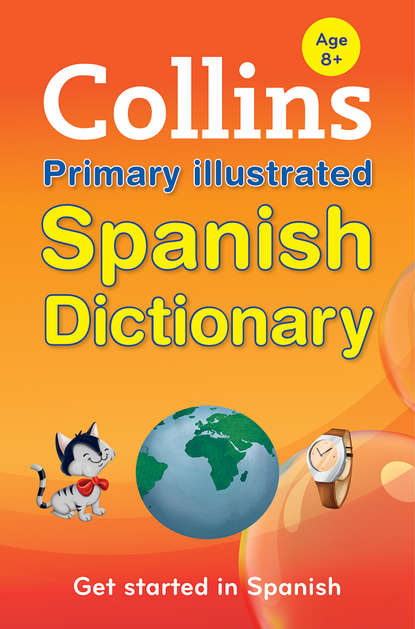скачать книгу бесплатно
shot
la distancia NOUN
distancela distancia entre dos coches the distance between two cars ¿Qué distancia hay entre Madrid y Barcelona? How far is Madrid from Barcelona? ¿A qué distancia está la estación? How far’s the station? a veinte kilómetros de distancia twenty kilometres away
distinguir VERB
to distinguishResulta difícil distinguir el macho de la hembra. It’s difficult to distinguish the male from the female. No distingue entre el rojo y el verde. He can’t tell the difference between red and green. Se parecen tanto que no los distingo. They’re so alike that I can’t tell them apart.
distinto (FEM distinta) ADJECTIVE
differentCarlos es distinto a los demás. Carlos is different to everyone else.
distintos several distintas clases de coches several types of car
la distracción (PL las distracciones) NOUN
pastimeCocinar es mi distracción favorita. My favourite pastime is cooking.
distraer VERB
1to keep … entertainedLes pondré un vídeo para distraerlos. I’ll put a video on to keep them entertained. Me distrae mucho escuchar música. I really enjoy listening to music.
2to distractNo me distraigas, que tengo trabajo. Don’t distract me. I’ve got work to do.
distraído (FEM distraída) ADJECTIVE
absent-mindedMi padre es muy distraído. My father is very absent- minded. Perdona, estaba distraído. Sorry, I wasn’t paying attention.
la diversión (PL las diversiones) NOUN
entertainment
Language tip
Be careful!diversióndoes not meandiversion.
divertido (FEM divertida) ADJECTIVE
funnyFue muy divertido. It was great fun.
divertir VERB
to entertainNos divirtió con sus cuentos. He entertained us with his stories.
■ divertirseto have a good time
dividir VERB
to divideEl libro está dividido en dos partes. The book is divided into two parts. Divide cuatro entre dos. Divide four by two.
■ dividirseto divide/to share
Language tip
dividirsehas two meanings. Look at the examples.
Nos dividimos el trabajo entre los tres. We divided the work between the three of us. Se dividieron el dinero de la lotería. They shared the lottery money.
divierto VERB ▷seedivertirMe divierto mucho con ellos. I have a good time when I’m with them.
la división (PL las divisiones) NOUN
divisionen primera división in the first division Ya sabe hacer divisiones. He already knows how to do division.
el DNI ABBREVIATION (= Documento Nacional de Identidad)
ID card
el doble NOUN
twice as muchComes el doble que yo. You eat twice as much as I do. Trabaja el doble que tú. He works twice as hard as you do.
doce (FEM doce) ADJECTIVE, PRONOUN
twelveTengo doce años. I’m twelve.
Son las doce. It’s twelve o’clock. el doce de diciembre the twelfth of December Nació el doce de diciembre. He was born on the twelfth of December.
la docena NOUN
dozen
el doctor la doctora NOUN
doctorCuando crezca me gustaría ser doctor. I want to be a doctor when I grow up.
el documental NOUN
documentary
el documento NOUN
documentun documento oficial an official document el documento nacional de identidad the identity card
doler VERB
to hurtMe duele el brazo. My arm hurts.
Me duele la cabeza. I’ve got a headache. Me duele la garganta. I’ve got a sore throat.
el dolor NOUN
painGritó de dolor. He cried out in pain.
Tengo dolor de cabeza. I’ve got a headache. Tengo dolor de garganta. I’ve got a sore throat. Tengo dolor de estómago. I’ve got a stomachache.
doméstico (FEM doméstica) ADJECTIVE
domesticpara uso doméstico for domestic use las tareas domésticas the housework un animal doméstico a pet
el domingo NOUN
Sunday
Language tip
The days of the week are not spelled with a capital letter in Spanish.
La vi el domingo. I saw her on Sunday.
todos los domingos every Sunday el domingo pasado last Sunday el domingo que viene next Sunday
don MASC NOUN
don Juan Gómez Mr Juan Gómez
donde ADVERB
whereLa nota está donde la dejaste. The note’s where you left it.
dónde ADVERB
where¿Dónde vas? Where are you going? Le pregunté dónde estaba la catedral. I asked him where the cathedral was. ¿Sabes dónde está? Do you know where he is? ¿De dónde eres? Where are you from? ¿Por dónde se va al cine? How do you get to the cinema?
doña FEM NOUN
doña Marta García Mrs Marta García
dorado (FEM dorada) ADJECTIVE
golden
dormir VERB
to sleepAntonio durmió diez horas. Antonio slept for ten hours. dormir la siesta to have a nap estar medio dormido to be half asleep
■ dormirseto fall asleepMe dormí en el tren. I fell asleep on the train. Se me ha dormido el brazo. My arm has gone to sleep.
el dormitorio NOUN
bedroom
dos (FEM dos) ADJECTIVE, PRONOUN
1twoTenemos dos gatos. We have two cats.
2bothAl final vinieron los dos. In the end they both came. Los hemos invitado a los dos. We’ve invited both of them.
Tiene dos años. He’s two. Son las dos. It’s two o’clock. el dos de enero the second of January Nació el dos de enero. He was born on the second of January.
doscientos (FEM doscientas) ADJECTIVE, PRONOUN
two hundreddoscientos cincuenta two hundred and fifty
doy VERB ▷seedarSi quieres, te doy uno. If you want, I’ll give you one.
el drogadicto la drogadicta NOUN
drug addict
la ducha NOUN
shower
darse una ducha to have a shower
ducharse VERB
to have a shower
la duda NOUN
doubtTengo mis dudas. I have my doubts. Tengo una duda. I have a query. ¿Alguna duda? Any questions?
dudar VERB
to doubtLo dudo. I doubt it. Dudo que sea cierto. I doubt if it’s true. Dudó si comprarlo o no. He wasn’t sure whether to buy it or not.
el dueño la dueña NOUN
owner
duermo VERB ▷seedormirDuermo ocho horas todos los días. I sleep eight hours every day.
dulce
dulcecan be an adjective or a noun.
